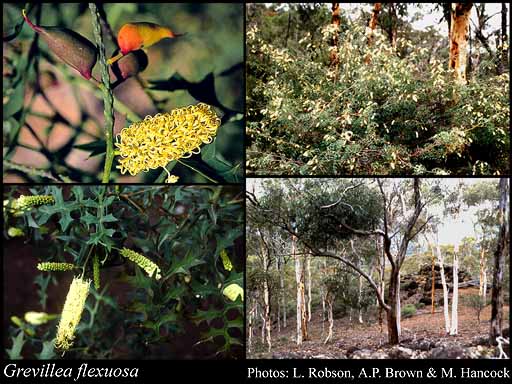- Reference
- Lehm., Pl.Preiss. [J.G.C.Lehmann] 1:553 (1845)
- Conservation Code
-
Threatened
A taxon name retains its ‘Threatened’ status until a new name has been officially endorsed and appears in the Gazettal Notice.
- Naturalised Status
- Native to Western Australia
- Name Status
- Current
Irregular, few-branched, non-lignotuberous shrub, to 2 m high. Fl. creamy-yellow, Jul to Oct. Red-brown sand with laterite & gravel, sand over granite. Ridgetop plateau & associated breakaways.

Scientific Description
Shrubs, 1-1.5 m high; branchlets glabrous, not glaucous. Leaves alternate, 55-130 mm long, glabrous; lamina flat, twice or more divided, pinnately divided, divided to the midrib; lobes 5-20 mm long, 4-10 mm wide, the margins flat. Inflorescences axillary or terminal, white, cream or yellow; pedicels 1-2.5 mm long. Perianth 3-6 mm long; tepals all free after flower opens, glabrous; ovary glabrous, stipitate, the stipe 1-1.5 mm long; pistil 5-7 mm long, white, cream or yellow, pollen presenter conical, style glabrous. Follicles glabrous, not viscid, dehiscent, 20 mm long. Flowers in July, August or September. Occurs in the South-west (SW) Botanical Province(s), in the Avon Wheatbelt (AW) or Jarrah Forest (JF) IBRA subregion(s). : Conservation code Threatened (T).
Distribution
- IBRA Regions
- Jarrah Forest.
- IBRA Subregions
- Northern Jarrah Forest.
- Local Government Areas (LGAs)
- Mundaring, Swan, Toodyay.